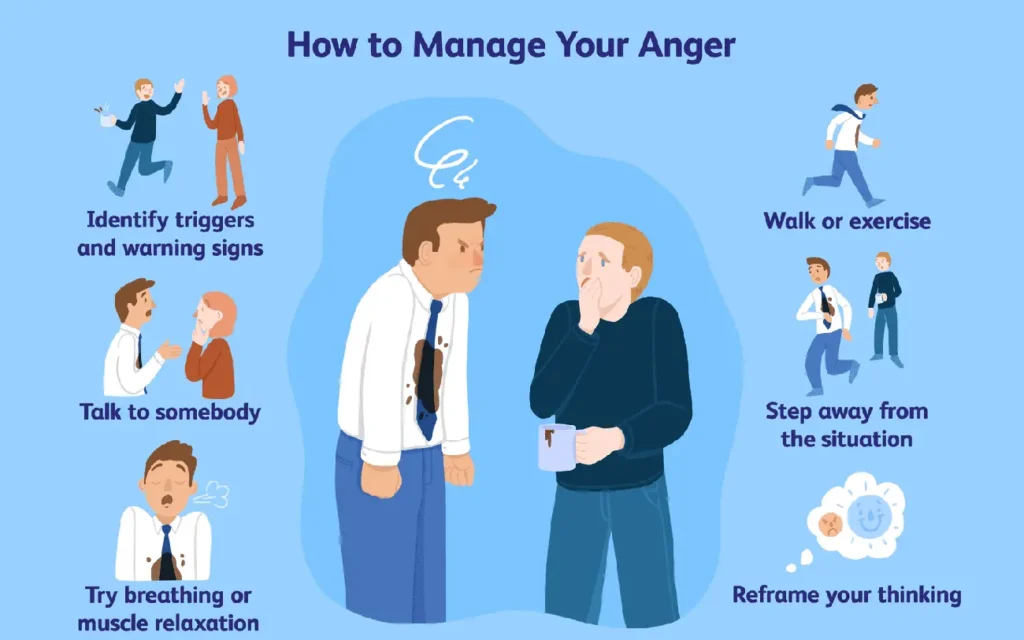Uncontrolled anger affects your relationships and increases your risk of coronary heart disease. Anger naturally occurs in everyone’s life, and learning to manage it effectively has become significant to our mental and physical wellbeing.
My personal experience shows how anger can turn into aggression and destroy personal relationships. The good news is that professional help works – studies show that 94% of people who seek help report most important improvements in managing their emotional challenges. Simple strategies like deep breathing, relaxation techniques, and cognitive restructuring can help you regain control of your emotions.
These 10 practical tips will help you take charge of your emotions and stop anger from controlling your life, whether you experience occasional outbursts or want better anger management skills.
Identify Your Anger Triggers

Understanding what makes us angry helps us control our emotions better. Each person has unique anger triggers that can come from both internal and external sources.
Common Modern Anger Triggers
My work in anger management shows these triggers appear most often today:
- Feeling unfairly treated at work
- Being ignored or disrespected
- Someone using our belongings without permission
- Traffic jams and technology issues
- Financial stress
- Perceived criticism or blame
Creating a Trigger Journal
You should keep an anger diary to track your emotional responses. Studies show that writing down your anger episodes helps you understand your emotions better. Your journal should include:
- The situation that triggered your anger
- Your physical and emotional reactions
- The intensity of your feelings
- The whole ordeal’s outcome
Developing Trigger Action Plans
On top of that, it’s time to create targeted action plans once you spot your triggers through journaling. Research shows about 7% of adults in the United States struggle with intermittent explosive disorder. This makes having strategies ready a vital part of management.
My recommendation is to develop “trigger action plans” – specific responses for each type of trigger. To name just one example, if traffic sets off your anger, you could plan different routes or change your schedule to avoid rush hours.
Some triggers might be unavoidable, so we need to focus on our response rather than elimination. You might think over changing your daily routine to handle stress better before facing known trigger situations.
Note that you can’t completely avoid all triggers – that’s not realistic. The goal is to build awareness and develop healthier responses. Regular journaling and action plans will help you notice patterns in your anger responses and adjust your strategies.
Master Quick-Calm Techniques

A quick calming technique can make all the difference when anger hits. My clients have learned to regain control in tough situations by becoming skilled at these rapid calming methods.
5-Second Calming Methods
The countdown breathing method stands out as my top recommendation. Research shows that controlled breathing can substantially reduce anger levels. Here’s a proven approach that works:
- Inhale deeply through your nose for 5 seconds
- Hold for 2-3 seconds
- Exhale slowly through your mouth for 5 seconds
- Repeat until you feel centered
Physical Grounding Exercises
Progressive muscle relaxation has shown remarkable results in my practice. Studies indicate this technique helps break the anger response cycle [3]. You can start with your toes and work your way up to your head. Just tense each muscle group for 5 seconds and release.
Physical grounding works best especially when you have:
- Heated arguments
- Important meetings ahead
- Overwhelming feelings
- Traffic situations
Emergency De-escalation Tools
Without doubt, ready-to-use emergency tools can stop anger from escalating. Visualization is one powerful method I teach. You can picture yourself in a peaceful setting while you practice deep breathing.
The LOWLINE method has proven its worth :
- Listen to understand the situation
- Offer reflective comments
- Wait before responding
- Look with appropriate eye contact
- Incline head slightly
- Nod to show understanding
- Express empathy
Research shows about 90% of emotional information is communicated through body language. This makes calm body posture crucial during heated moments.
Keep in mind, these techniques work best if you keep taking them. Studies show consistent practice turns these methods into automatic responses to anger triggers. All the same, different techniques suit different people, so try various approaches until you find your perfect match.
Improve Sleep Quality
My research over the years has shown that sleep quality plays a significant role in how we handle our anger. The numbers are striking – missing just a few hours of sleep makes us 80% more likely to feel angry and frustrated.
Sleep-Anger Connection
Sleep and anger affect each other in both directions. When we don’t sleep well, our emotional balance gets disrupted and we become more sensitive to things that make us angry. Research shows that sleep-deprived people are much angrier than those who get enough rest. This creates a tough cycle – anger makes it hard to sleep, and lack of sleep makes us angrier.
Creating a Calming Bedtime Routine
A consistent bedtime routine helps break this cycle. Science backs these effective methods:
- Quiet reading or gentle stretching
- Soothing music
- Controlled breathing exercises
- Stay away from electronic devices that reduce melatonin.
Sleep Hygiene Tips
Good sleep hygiene is the foundation of anger management. Years of research point to these proven practices:
- Environment Management
- Your bedroom should be dark and quiet
- White noise helps mask disruptive sounds
- Keep the temperature comfortable
- Behavioral Adjustments
- Cut out caffeine later in day
- Don’t eat heavy meals late at night
- Watch your alcohol intake before bed
Research confirms that poor sleep directly leads to problems with emotional control. My clients who make sleep a priority handle frustrating situations much better.
The sweet spot is 7-9 hours of quality sleep each night. Missing just two hours can reduce your ability to deal with irritating situations. These sleep hygiene techniques, when practiced regularly, will give you better control over your anger responses.
Practice Assertive Communication

My anger management practice has shown me that knowing how to communicate assertively is a powerful tool. Years of experience have taught me how good communication prevents anger from turning into destructive behavior.
Assertive vs. Aggressive Speech
Relationship breakdowns and increased stress often stem from poor communication. The difference between assertive and aggressive communication is vital. Here’s a clear comparison:
Assertive Communication | Aggressive Communication |
|---|---|
Respects others’ rights | Dominates conversations |
Clear and direct speech | Uses condescending tone |
Open body language | Intimidating posture |
Takes responsibility | Shifts blame to others |
Using 'I' Statements Effectively
‘I’ statements help reduce blaming, accusations, and defensive reactions. This technique might feel strange at first but opens up more chances to resolve conflicts. Here’s my recommended formula:
- “When you…” (state observation)
- “I feel…” (express emotion)
- “Because…” (explain impact)
- “I would prefer…” (suggest solution)
‘I’ statements work because they let you express your needs clearly without making others defensive. People can better explain what they want and need while showing respect for others.
Difficult Conversation Scripts
Ready-to-use scripts are great tools for challenging situations. Starting tough conversations with “I want to chat with you about [specific issue]” creates a positive tone. Observations and focus on future improvements keep the dialog solution-oriented.
These steps help if someone becomes defensive:
- Pause the conversation
- Reinforce positive intent
- Acknowledge emotions
- Offer space to continue later
Better relationships and anger management results come from regular practice of assertive communication. This method builds mutual understanding and ensures everyone’s needs get proper attention.
Create an Anger Management Routine
My structured routine has become the foundation of managing anger better. Research shows people who stick to daily routines have 60% fewer anger outbursts.
Morning Anger Prevention Rituals
Starting the day mindfully creates a positive tone. You can begin your day peacefully by waking up early, without the rush that often triggers stress. Here’s my recommended morning routine:
- Deep breathing exercises (5-10 minutes)
- Physical movement or light stretching
- Gratitude journaling
- Screen-free time (first 30 minutes)
Daily Stress Management Schedule
We learned that managing stress throughout the day stops anger from building up. Here’s what works best:
Time | Activity | Purpose |
|---|---|---|
Morning | Exercise/Movement | Release tension |
Mid-morning | Breathing breaks | Reset emotions |
Afternoon | Quick meditation | Maintain calm |
Evening | Reflection time | Process emotions |
Evening Wind-Down Practices
Evening practices help you process the day’s emotions and prepare for restful sleep. Studies show people who use evening wind-down routines report 45% better emotional regulation [15].
These proven techniques make a real difference:
- Progressive muscle relaxation
- Writing in an anger journal
- Planning for tomorrow’s potential triggers
- Creating a calm environment
Consistency matters more than perfection. Research reveals people who follow their anger management routines for at least 21 days show major improvements in emotional control.
My experience shows clients who keep these structured routines make remarkable progress in managing their anger. Physical activities in your daily schedule can reduce stress levels by 40%.






